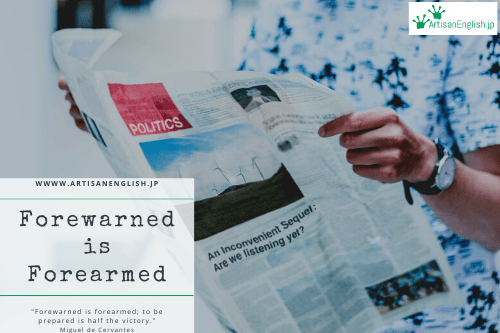
YouTube / iTunes / Spotify / Radio Public / Pocket Casts / Google Podcasts / Breaker / Overcast
Listen to ArtisanEnglish.jp posts & lesson intros here.
Proverb: Forewarned is forearmed
When offering advice on preparing for the future, someone may say forewarned is forearmed.
What they mean is that it’s better to know what is going to happen before it happens.
That way, you can be better prepared for when it does.
This is part of a quote from Miguel de Cervantes.
He is the most famous Spanish author, responsible for giving us the antics of Don Quixote and Sancho Panza.
If you haven’t read Don Quixote, I strongly recommend it.
You will never look at a windmill the same again.
Anyways, as I said, forewarned is forearmed is only part of the quote, the full quote runs:
Forewarned is forearmed; to be prepared is half the victory.
Miguel de Cervantes
It seems to me most people only use the first part.
On the whole, this is excellent advice for anyone to follow.
For example, the Japanese government has finally realized that it is at least 20 years behind the trend in technology.
I mean, most people under 30 years of age in other countries have never seen a fax machine.
So, forewarned is forearmed.
If you work in an office, begin reading up on anything and everything tech-related.
There is a huge technological advancement push coming down the pike very shortly.
I would also not advise anyone to take up a career involved in teaching children or perhaps even university students.
The population is in decline.
Fewer people mean fewer kinds, which means a smaller need for teachers.
Don’t train for a job that’s in demand today.
Train for the career of tomorrow.
If you don’t believe me, believe Cervantes.
He’s the one who said, “Forewarned is forearmed; to be prepared is half the victory.”
Flesch-Kincaid Readability Test
This post is understandable by someone with at least an 8th-grade education (age 13 – 14).
On the Flesch-Kincaid reading-ease test, this post scores 68.
The easier a passage is to read, the higher the score on a scale of 0 – 100.

